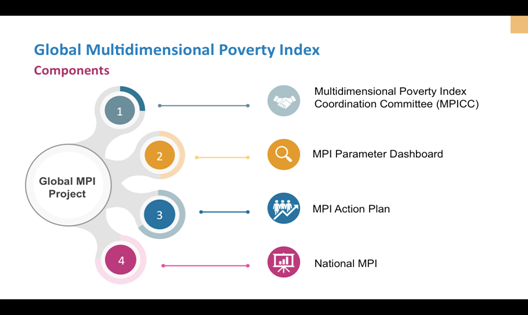 NITI Aayog as the nodal agency has been assigned the responsibility of leveraging the monitoring mechanism of the Global Multidimensional Poverty Index (MPI) to drive reforms. Global MPI is part of Government of India’s decision to monitor the performance of the country in 29 select Global Indices. The objective of the “Global Indices to Drive Reforms and Growth (GIRG)” exercise is to fulfil the need to measure and monitor India’s performance on various important social and economic parameters and enable the utilisation of these Indices as tools for self-improvement, bring about reforms in policies, while improving last-mile implementation of government schemes. The Cabinet Secretary had earlier in July organised a workshop with all the nodal agencies where he also emphasized the need for regular engagement with Publishing Agencies.
NITI Aayog as the nodal agency has been assigned the responsibility of leveraging the monitoring mechanism of the Global Multidimensional Poverty Index (MPI) to drive reforms. Global MPI is part of Government of India’s decision to monitor the performance of the country in 29 select Global Indices. The objective of the “Global Indices to Drive Reforms and Growth (GIRG)” exercise is to fulfil the need to measure and monitor India’s performance on various important social and economic parameters and enable the utilisation of these Indices as tools for self-improvement, bring about reforms in policies, while improving last-mile implementation of government schemes. The Cabinet Secretary had earlier in July organised a workshop with all the nodal agencies where he also emphasized the need for regular engagement with Publishing Agencies.
2. Global MPI is an international measure of multidimensional poverty covering 107 developing countries and was first developed in 2010 by Oxford Poverty and Human Development Initiative (OPHI) and United Nations Development Programme (UNDP) for UNDP’s Human Development Reports. The Global MPI is released at the High-Level Political Forum (HLPF) on Sustainable Development of the United Nations in July, every year.
3. Global MPI is computed by scoring each surveyed household on 10 parameters based on -nutrition, child mortality, years of schooling, school attendance, cooking fuel, sanitation, drinking water, electricity, housing and household assets. It utilises the National Family Health Survey (NFHS) which is conducted under the aegis of Ministry of Health and Family Welfare (MoHFW) and International Institute for Population Sciences (IIPS). According to Global MPI 2020, India is 62nd among 107 countries with an MPI score of 0.123 and 27.91% headcount ratio, based on the NFHS 4 (2015/16) data. Neighbouring countries like Sri Lanka (25th), Bhutan (68th), Nepal (65th), Bangladesh (58th), China (30th), Myanmar (69th) and Pakistan (73rd) are also ranked in this index (we can pick and choose the countries). The latest NFHS 5 (2019/20) is set to see remarkable national improvement brought about by focused schemes and interventions in these parameters since NFHS 4, especially in sanitation, cooking fuel, housing, drinking water and electricity. The survey has been paused due to the COVID-19 pandemic.
4. As the Nodal agency for the MPI, NITI Aayog has constituted a Multidimensional Poverty Index Coordination Committee (MPICC). The MPICC, chaired by Ms Sanyukta Samaddar, Adviser (SDG) has members from relevant Line Ministries and Departments, namely Ministry/ Department of Power, WCD, Telecommunication, MoSPI, Rural Devleopment, Petroleum & Natural Gas, Food & Public Distribution, Drinking Water & Sanitation, Education, Housing & Urban Affairs, Health & Family Welfare, and Financial Services. These Ministries/ Departments have been mapped to the ten parameters of the index. Experts from OPHI and UNDP, as the publishing agency, have also been onboarded for their technical expertise. The inaugural meeting of the MPICC was held on 2 September 2020. Preparation of a MPI Parameter Dashboard to rank States and UTs, and a State Reform Action Plan (SRAP) are at an advanced stage of development. The MPICC will next be organising a workshop with representatives of States and UTs for taking the SRAP forward.

